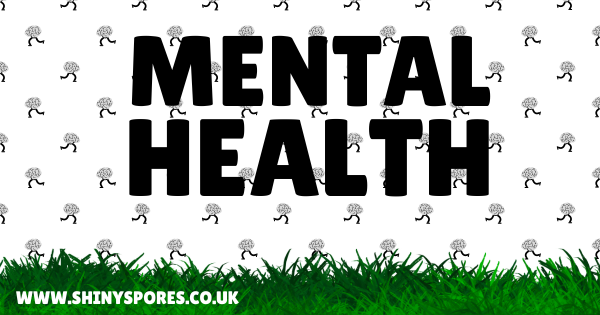Mushrooms: A Natural Boost for World Mental Health Day

As we celebrate World Mental Health Day on 10th October 2024, it’s important to spotlight natural solutions for mental well-being. While therapy, medication, and self-care practices remain at the forefront, there’s growing interest in the potential of mushrooms to support mental health. From gourmet mushrooms like lion’s mane to discussions around the therapeutic use of psilocybin (magic mushrooms), there’s much to explore.
Gourmet Mushrooms for Mental Well-Being
Gourmet health mushrooms have long been lauded for their range of health benefits, particularly in relation to immunity and overall vitality. However, recent research has revealed that these fungi could also positively impact mental health.
Lion’s Mane: Nature’s Brain Booster
Lion’s mane (Hericium erinaceus) is perhaps the most exciting gourmet mushroom when it comes to brain health. Studies suggest that it can enhance cognitive function, improve memory, and potentially ward off neurodegenerative diseases like Alzheimer’s. This is due to compounds in lion’s mane that promote the growth and repair of nerve cells, specifically encouraging the production of nerve growth factor (NGF) (Mori et al., 2009).
When it comes to mental health, lion’s mane may help reduce anxiety and depression. A study published in 2020 found that consuming lion’s mane extract over four weeks reduced feelings of irritability and anxiety in the participants (Nagano et al., 2020). While the exact mechanisms are still being explored, it’s thought that the mushroom’s neuroprotective properties could be key.
Reishi: The Stress Reliever
Reishi (Ganoderma lucidum) is another mushroom that’s gaining popularity for its mental health benefits. Known for its adaptogenic qualities, reishi helps the body cope with stress by regulating cortisol levels, the hormone responsible for stress responses. Regular consumption of reishi has been linked to better mood regulation and reduced anxiety, making it an ideal addition to any mental health routine (Wachtel-Galor et al., 2011).
Psilocybin: Magic Mushrooms and Mental Health
The use of psilocybin, the active compound in magic mushrooms, has become a trending topic in the mental health sphere. Historically stigmatised for its hallucinogenic effects, psilocybin is now being seriously considered by researchers as a potential treatment for various mental health conditions, including depression, anxiety, and PTSD.
Clinical Trials and Studies
In 2022, the first phase of a groundbreaking UK-based trial using psilocybin for treatment-resistant depression reported promising results. Participants who took psilocybin alongside psychotherapy showed significant improvement in depressive symptoms (Carhart-Harris et al., 2022). This adds to a growing body of research from around the world demonstrating the efficacy of psilocybin-assisted therapy in addressing mental health issues where conventional treatments have failed.
Changing Perceptions
Public perception of psilocybin is shifting, with many now seeing it as a legitimate alternative treatment rather than a recreational drug. The UK government recently announced plans to review its classification of psilocybin in light of emerging research (BBC News, 2023). As we gain a better understanding of how psilocybin works on the brain – particularly in enhancing neural connectivity and reducing rumination – it’s likely we’ll see further developments in its legal and medical use.
Incorporating Mushrooms into Your Routine
For those looking to enhance their mental health naturally, gourmet mushrooms like lion’s mane and reishi are widely available in various forms – from powders to capsules. They offer a safe and effective way to promote brain health, reduce stress, and support overall well-being.
While the use of psilocybin remains strictly controlled, the future looks bright for its therapeutic potential. As research continues, we may soon see psilocybin-based treatments becoming more mainstream in the UK and beyond.
Conclusion
On this World Mental Health Day, consider the humble mushroom as a powerful ally in your mental wellness journey. Whether through the use of gourmet mushrooms like lion’s mane and reishi or keeping an eye on the developments in psilocybin research, fungi could play an important role in mental health care moving forward.
#WorldMentalHealthDay2024 #MushroomsForMentalHealth #Lion’sMane #Reishi #PsilocybinTherapy #NaturalMentalHealth #GourmetHealthMushrooms
References
- Carhart-Harris, R., et al. (2022) ‘Psilocybin with psychological support for treatment-resistant depression: six-month outcomes’, The Lancet Psychiatry, 9(8), pp. 605-617.
- Mori, K., Inatomi, S., Ouchi, K., Azumi, Y. and Tuchida, T. (2009) ‘Improving effects of the mushroom Hericium erinaceus on mild cognitive impairment: a double-blind placebo-controlled clinical trial’, Phytotherapy Research, 23(3), pp. 367-372.
- Nagano, M., Shimizu, K., Kondo, R., and Hayashi, C. (2020) ‘Reduction of anxiety and depression in a four-week lion’s mane trial: A pilot study’, Journal of Traditional and Complementary Medicine, 10(1), pp. 65-72.
- Wachtel-Galor, S., Tomlinson, B., and Benzie, I.F.F. (2011) ‘Ganoderma lucidum (Reishi mushroom)’, in Benzie, I.F.F. and Wachtel-Galor, S. (eds.) Herbal Medicine: Biomolecular and Clinical Aspects. 2nd edn. Boca Raton: CRC Press.
- BBC News (2023) ‘UK government to review classification of psilocybin for therapeutic use’, BBC News, 14 January.









